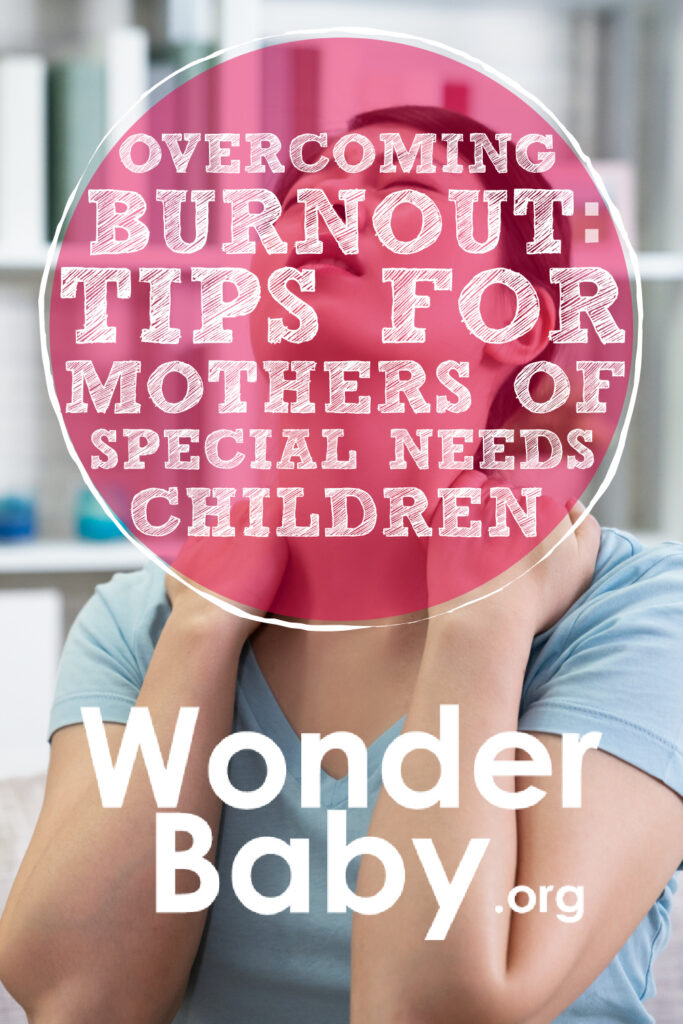Overcoming Burnout: 6 Tips for Mothers of Special Needs Children

- Parental or caregiver burnout is a common experience for mothers of special needs children.
- Prolonged feelings of isolation, exhaustion, stress, and anxiety can compromise caregivers’ mental and physical health.
- Recognizing burnout when it’s happening to you and taking steps to address it are important for your health and the overall health of your family.
- Asking for help, taking time out, and self-care are crucial for special needs parents and their well-being.
If you’re a special needs parent or caregiver, then the idea of self-care, meditation, and exercise may seem completely unrealistic or unattainable. You don’t have time most days to even take a deep breath. How could you possibly fit in time for journaling, a run, or coffee with a friend?
However, these are exactly the types of activities that special needs moms need to do to help avoid parental or caregiver burnout. Many parents are so focused on the needs of their children that they forget about their own physical and mental well-being.
When that starts to happen, the stress and worry of special needs parenting can build up and compromise your health, relationships, and family life, causing symptoms of burnout like anxiety, fatigue, and insomnia.
Staying healthy, having a support network, taking time away from your child, and getting professional help when you need it are essential for overcoming burnout as a special needs parent.
Signs of Caregiver Burnout

Parental burnout or caregiver burnout is a recognized condition. The exhaustion, isolation, frustration, and anxiety felt by many parents and caregivers of special needs children can compromise physical health and cause mental health issues as serious as post-traumatic stress disorder (PTSD).
A recent study of parental burnout in special needs parents11. Roskam, I., & Mikolajczak, M.. Parental Burnout in the Context of Special Needs, Adoption, and Single Parenthood. Children. 2023;10(7), 1131. https://doi.org/10.3390/children10071131 describes it as “a disorder characterized by physical and/or emotional exhaustion as a parent, emotional distancing from children, feelings of being fed up in the parental role, and a sense of contrast with the previous parental self.”
The hypervigilance, chronic stress, and exhaustion that are a common part of caring for a child with special needs can result in:
- Anxiety
- Depression
- Feeling fatigued
- Feeling overwhelmed
- Fluctuations in weight
- Insomnia or constantly feeling tired
- Marital problems
- Compromised family and personal relationships
- Difficulties at work
Studies have shown that parents of children with ADHD and autism22. Lovell, B., Moss, M., & Wetherell, M.. The psychosocial, endocrine and immune consequences of caring for a child with autism or ADHD. Psychoneuroendocrinology. 2012;37(4), 534–542. https://doi.org/10.1016/j.psyneuen.2011.08.003 have higher levels of cortisol, the stress hormone, and inflammatory biomarkers that put them at a higher risk of many diseases.
Can I really put my own needs before my children?

Of course, parents of children with special needs love their children, take pride in their achievements, and have joyful times in their families. While there are challenges, there are also times of great satisfaction and happiness when raising a special needs child.
However, it is undeniable that caregiver burnout is a real issue that special needs parents experience, which has consequences for their physical and mental health.
To avoid burnout so that you can be there for your kids, consider some of the following tips and resources to reduce stress, take care of your emotions, and look after your physical health when dealing with challenges as a special needs parent.
1. Prioritize Your Physical Health

Long-term, chronic stress can have a serious impact on your physical health, as well as your mental well-being.
While it may not be possible to fully remove the stress that comes with being a special needs parent, it is important to try to manage it.
Prioritize your physical health every day by:
- Eating healthily
- Staying hydrated
- Exercising, even if that just means a ten-minute walk around the block, taking the stairs at work, or stretching for five minutes when you wake up
- Going to physical check-ups regularly and keeping your own medical appointments
Taking care of yourself physically should not feel like another thing you can’t get to on your impossibly long to-do list or something you feel guilty for not doing.
If you can go to a yoga class or spend an hour at the gym every day, that’s amazing. However, if ten minutes of brisk walking on the treadmill in the basement is all you can manage, give yourself credit for doing that, too.
Any time, however short, that you can take for yourself to move, breathe, and relax can help reduce your stress.
2. Nurture Emotional and Mental Well-being

Feelings of isolation, worries about your child’s future, financial stress, and emotional hurt caused by the insensitivity or lack of understanding from others can be difficult to deal with.
You may also feel guilt about taking personal time for relaxation, ‘me-time,’ or social activities when you have so many responsibilities.
Experts at the Child Mind Institute33. Garey, J.. Why Self-Care Is Essential to Parenting. Child Mind Institute. 2023. https://childmind.org/article/fighting-caregiver-burnout-special-needs-kids agree that it’s important to “challenge the idea that you are the only one who can help and there is no limit to what you need to do.”
Take some time for emotional rest and rejuvenation. Any of the following can help take care of your emotions:
- Journaling
- Reading
- Talking with a friend
- Deep breathing exercises
- Spending time alone away from your kids
The positive effects of taking care of your emotional self are backed up by research. A study examining the effect of mindfulness training for parents of children with autism44. Weitlauf, A. S., Broderick, N., Stainbrook, J. A., Taylor, J. L., Herrington, C. G., Nicholson, A. G., Santulli, M., Dykens, E. M., Juárez, A. P., & Warren, Z. E.. Mindfulness-Based Stress Reduction for Parents Implementing Early Intervention for Autism: An RCT. Pediatrics. 2020;145(Supplement_1), 581–592. https://doi.org/10.1542/peds.2019-1895k found that mindfulness techniques, such as cultivating gratitude and meditation, resulted in significantly reduced parental stress.
Guided meditation and mindfulness apps can be used anywhere and for even very short periods of time. Don’t deny yourself some parental self-care because you think it’s too time-consuming or too much effort.
3. Build a Supportive Community

Caring for a child with special needs can be a full-time job. Sometimes parents and caregivers may have feelings of loneliness and isolation. When you’re dealing with your child’s specific challenges, you might feel like you’re the only parent or family who has ever faced these issues.
Even well-meaning friends and family may not understand your situation, which can also be frustrating. However, there are many communities of special needs parents who can offer support, connection, and advice to help you feel less alone.
If you’re looking for local support groups or an online community, there are many organizations that can help:
- Parent to Parent: A nationwide support group for special needs parents
- AANE: Association for Autism and Neurodiversity
- CHADD (Children and Adults with ADHD): Provides information and resources and they also have an online community at ADHD parents
- Family Voices: An organization for families of children with special health care needs
4. Seek Professional Assistance

You do so much multi-tasking, management, and meeting with professionals to talk about your child that you may overlook your own needs for help, advice, and support.
Seeking professional help from a therapist or counselor can help you avoid burnout. They can also help you with specific needs or issues you may have or that your family may be facing, such as a strain on your marriage or difficulty connecting with a teenage child.
Whether it’s a psychologist to help with symptoms of anxiety or a special needs parenting class to answer your questions, finding professional help can ease the pressure you may be feeling and can help you be a better parent and partner.
Respite Care
Respite care is another way that professionals can be a part of your support system. Respite care gives you a break from caregiving.
Respite care allows you to leave your child with a professional caregiver or in a drop-off program where you can be assured that they will be safe and taken care of.
If your child has complex needs or behavioral issues that you do not feel can be handled by babysitters, family, or friends, respite caregivers or respite programs55. Sewell-Roberts, C.. Finding Respite Care. KidsHealth. 2021. https://kidshealth.org/en/parents/respite-care.html can help give you some much-needed time off.
5. Delegate and Be Specific

You may need help but be afraid or embarrassed to ask for it. Family members, friends, and neighbors may want to offer support, but they may not know how to do it or what would be the most helpful to you.
By being open and honest with people in your life about the specific support you need, you may find that you have a really strong support system in place. You just have to reach out and ask for their help!
Being direct can help you get things done and can allow friends and family to help in a meaningful way.
Ask for something specific, like babysitting for two hours so you can go to the dentist, buying a list of things from the grocery store, or picking up your other child from school so you can meet with a teacher.
You may be surprised by how happy and eager people are to help, especially if you’re having a tough time. You just have to tell them what you need. This avoids confusion and wasted time and gives people who care about you and your child an opportunity to be there for you.
Delegation in your household66. Parenting children with special needs. Psychology Today. https://www.psychologytoday.com/gb/basics/parenting/parenting-children-special-needs#how-can-parents-maintain-self-care-while-caring-for-a-special-needs-child will also help. Once your children are old enough, they can have chores and responsibilities in your home. You and your partner should have an open conversation about shared tasks and appointments to make sure they aren’t falling solely on one of you.
You can create a sense of teamwork within the family unit where everyone has a job and pitches in. That will make you feel more supported, too.
6. Set Realistic Expectations

Pressuring yourself to do as much as possible, to try every intervention, and to take care of every single detail of your child’s education and care can also add to caregiver burnout.
As the parent of a special needs kid, you may think that you always have to go the extra mile because you may feel that you and your child are under additional scrutiny by teachers, therapists, doctors, social workers, and other parents.
It’s important to remember and accept that there are limits on what you can control about your child’s diagnosis and your family’s situation. Imperfections, challenges, mishaps, and mistakes will be part of every parent’s journey.
While you won’t know how to handle every challenge that comes your child’s way, one thing that you will always be able to do is celebrate their victories and enjoy their achievements.
Appreciating small, everyday accomplishments and taking pride in your child’s progress is also a part of caring for yourself.
So congratulate yourself and your child on your daily wins. They are just as important as the challenges you face.
References
- Roskam, I., & Mikolajczak, M. (2023). Parental Burnout in the Context of Special Needs, Adoption, and Single Parenthood. Children, 10(7), 1131. https://doi.org/10.3390/children10071131
- Lovell, B., Moss, M., & Wetherell, M. (2012). The psychosocial, endocrine and immune consequences of caring for a child with autism or ADHD. Psychoneuroendocrinology, 37(4), 534–542. https://doi.org/10.1016/j.psyneuen.2011.08.003
- Garey, J. (2023, October 30). Why Self-Care Is Essential to Parenting. Child Mind Institute. https://childmind.org/article/fighting-caregiver-burnout-special-needs-kids
- Weitlauf, A. S., Broderick, N., Stainbrook, J. A., Taylor, J. L., Herrington, C. G., Nicholson, A. G., Santulli, M., Dykens, E. M., Juárez, A. P., & Warren, Z. E. (2020). Mindfulness-Based Stress Reduction for Parents Implementing Early Intervention for Autism: An RCT. Pediatrics, 145(Supplement_1), 581–592. https://doi.org/10.1542/peds.2019-1895k
- Sewell-Roberts, C. (Ed.). (2021, September). Finding Respite Care. KidsHealth. https://kidshealth.org/en/parents/respite-care.html
- Parenting children with special needs. Psychology Today. (n.d.). https://www.psychologytoday.com/gb/basics/parenting/parenting-children-special-needs#how-can-parents-maintain-self-care-while-caring-for-a-special-needs-child

Related Posts

Eye Conditions and Syndromes, Visual Impairment
Neuralink Announces Plans to Restore Sight to the Blind with Brain Chip
Elon Musk’s company Neuralink has announced plans to begin human trials of its new “Blindsight” brain chip by the end of 2025.

Special Needs
5 Spring Cleaning Tips for Families of Children with Disabilities
Spring cleaning is an opportunity to create a more accessible, organized, and supportive space for your child with disabilities. Declutter, deep clean, and refresh!

Visual Impairment
The Gift of Understanding: How a Young Child Helps His Blind Father Navigate Life
When a parent is blind, it’s natural for people to wonder how their sighted child will adapt. Will they struggle to understand their parent’s needs? Will they feel burdened by...